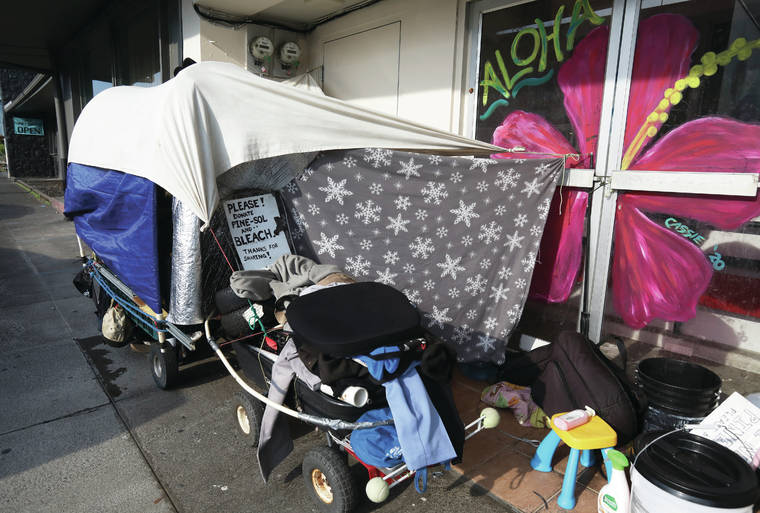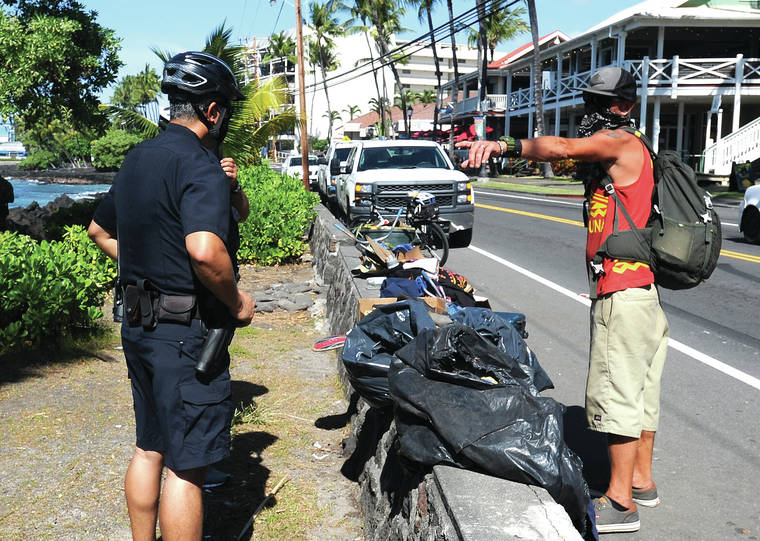The state’s point man on homeless issues told lawmakers Wednesday he expects the economic fallout from the coronavirus pandemic to result in a gradual increase in homelessness statewide over the next few years.
Speaking to a joint session of the Senate Committee on Human Services and House Committee on Health, Human Services and Homelessness, Scott Morishige, Gov. Ige’s coordinator on homelessness, used the state’s homeless numbers following the Great Recession of 2008 as a predictor.
“After the last recession in Hawaii, homelessness increased in Hawaii by 2,100 people during that seven-year period between 2009 and 2016. It was a nearly 37% increase,” Morishige said. “… It’s important to recognize that the increase in homelessness that we saw was not a onetime spike. It was a gradual increase over time.
“And it’s likely that any future increase that we see as a result of the current economic impact … related to the pandemic is going to result in a similar increase that’s not just a onetime spike, but is going to occur gradually over a longer period of time, and probably on a greater level of magnitude than what we had encountered previously.”
The pandemic has caused a severe downturn in the state’s tax revenues since March of last year. That means state funding approved for homeless services is expected to decrease during the 2021 legislative session, which begins Jan. 20.
“We are working … with other state agencies such as (Department of Labor and Industrial Relations), Department of Hawaiian Homelands, and so forth, so we can identify opportunities where we can really leverage other federal funding streams or other pots of money,” Morishige said. “Because we really realize the severe economic situation that the state is in, and we know that we need to do coordination planning at a systems level to … effectively continue to support these programs moving forward.”
During the online conference billed by the state as “2021 Hawaii Homelessness Summit,” Sen. Joy San Buenaventura of Puna, the Human Services chairwoman, asked about COVID-19 clusters in Hawaii’s homeless shelters or encampments, but none of the summit participants reported large outbreaks.
Lori Tsuhako, Maui County’s Housing and Human Concerns director, said the county had “a few incidences of homeless individuals who tested positive.”
“Some of those have used Department of Health-administered quarantine sites on our island,” Tsuhako said. “We thank heavens that we haven’t had a large outbreak among the unsheltered homeless population, and we thank the outreach providers who have very selflessly gone out and have been providing (personal protective equipment), providing instruction on how to properly use the PPE, and who’ve been reinforcing all the public health guidance that we have been given about keeping safe during this COVID time.”
Laura Thielen, executive director Partners in Care, said her Oahu homelessness services organization “immediately had to pivot and change all the work that we have been doing.”
“One of the biggest things that we had to immediately do is to de-populate all of our congregate shelters,” said Thielen, the sister-in-law of the former state senator of the same name.
Thielen said her organization moved individuals with higher risk factors into transitional housing and increased their referrals of others for permanent housing.
“This was essential to the fact that we had a very small amount of COVID-positive cases within the homeless structure — which I give complete credit to the outreach workers and the providers who, not only did not stop working, but worked harder under more difficult situations than they have in the past,” she said.
Thielen also credited the statewide moratorium on evictions for nonpayment of rent for preventing an immediate large-scale uptick in homelessness.
Brandee Menino, CEO of Hope Services Hawaii in Hilo and chairwoman of the Neighbor Islands umbrella organization Bridging the Gap, said frequent Zoom meetings with homeless services stakeholders statewide have provided an opportunity to share the best practices for operating during the pandemic.
“We have learned from the outbreak on Oahu what we could be preparing for here on the neighbor islands to prevent outbreaks in our congregate shelters,” Menino said.
Email John Burnett at jburnett@hawaiitribune-herald.com.













